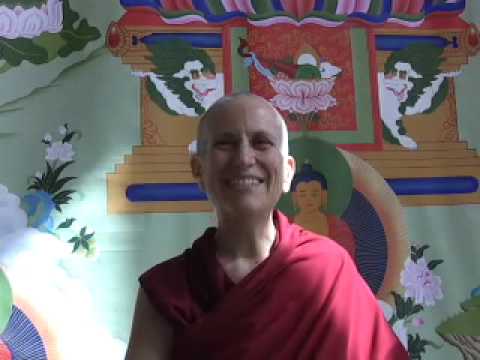Verse 40-8: Discriminating wisdom
Part of a series of talks on the 41 Prayers to Cultivate Bodhicitta from the Avatamsaka Sutra (the Flower Ornament Sutra).
- How we need wisdom in all aspects of our lives
- Understanding karma
- Wisdom understanding suchness
41 Prayers to cultivate bodhicitta: Verse 40-8 (download)
We’ve done six of the seven jewels of enlightenment. The verse was saying,
“May all beings attain the seven jewels of an exalted being (faith, ethics, learning, generosity, integrity, consideration for others and discriminating wisdom).”
This is the prayer of the bodhisattva when seeing someone engaged in business.
How to develop the inner jewels rather than external jewels. So far we have talked about faith, ethical conduct, learning, generosity, integrity, and consideration for others. The last one is discriminating wisdom.
Discriminating wisdom we need a lot of. We need it in many areas of our life. In a practical way just to live as a human being in this world. We need discriminating wisdom because otherwise we can’t run our lives very effectively. We’re shady here, and ineffective there, and so on. In terms of Dharma, we need discriminating wisdom that understands karma, that understands what actions (verbal, mental and physical actions) are the causes of happiness, and what actions are the causes of suffering, so that we can practice one and abandon the other. We need discriminating wisdom there, not just making up our own version like, “The lies other people tell. Those are non-virtuous. The lies I tell, there is a good reason and they’re okay.” We know that one already, don’t we? That’s not discriminating wisdom. That’s why you need discriminating wisdom.
We also need the discriminating wisdom that understands suchness, “suchness” being another word for emptiness, the lack of inherent existence of all persons and phenomena. We really need to put energy into developing that wisdom that can accurately discern how things exist, what exists and what doesn’t. Of the things that exist, how they exist. Things appear one way but they exist in another way. They appear very real and solid from their own side, like we’re living in an objective world, but in actual fact things come into existence through a process of labeling, and in relationship to the minds that perceive them. Developing discriminating wisdom about this really frees us from the suffering of our own projections, especially the projection or the appearance of inherent existence and this whole thing of feeling that there is an objective world out there, and a completely solid me in here.
Of course, then as soon as we have configured the world that way, how do we relate to it? “There’s me and there’s the world and I’m going to get what I want from the world. It has a duty to provide me with what I want and I’m going to fight with it when it doesn’t give me what I want.” That produces so many afflictions which lead to so many actions, which leads to so much suffering. We really need that discriminating wisdom that see’s how things exist.
Those are the seven jewels of an arya.
Venerable Thubten Chodron
Venerable Chodron emphasizes the practical application of Buddha’s teachings in our daily lives and is especially skilled at explaining them in ways easily understood and practiced by Westerners. She is well known for her warm, humorous, and lucid teachings. She was ordained as a Buddhist nun in 1977 by Kyabje Ling Rinpoche in Dharamsala, India, and in 1986 she received bhikshuni (full) ordination in Taiwan. Read her full bio.


